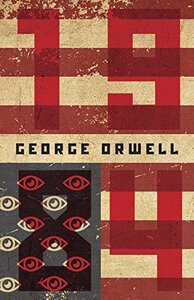You need to sign in or sign up before continuing.
Take a photo of a barcode or cover
adventurous
challenging
dark
reflective
medium-paced
For some reason Eric Blair, who was a good journalist, thought he should turn his hand to fiction. 1984 is downstream of Zamyatin's We and most of Franz Kafka's output, and it's probably the latter that is the more interesting comparison, because many people miss the general pointlessness of 1984's scenario. Presumably the Party is only interested in keeping itself in power - thus its disinterest towards the working class, dismissed as 'proles' (for 'proletariat') and who seem to just be getting on with life in a 1930s mill-town kind of way (there is surely a place for the Four Yorkshiremen version of this novel). As a result mind games are played with anyone who might challenge the system - which is probably, in fact the point. The point is not to break dissenters, like Winston Smith, but to recruit them. To bring them onside - hence the last line of the book which is unlike the film adaptation's ending. It's even possible to surmise that Winston is being specifically targeted - which surmise is worthy of a John Le Carre novel.
What's also interesting, and may derive from HG Wells' treatment of this same subject, is what 1984 does with language. Both Wells and Blair were interested in 'Basic English,' an attempt to streamline the English language for better communication - a kind of Esperanto without having to actually invent any new words. And both writers realised fairly soon that its powers, while great, could be used to control thought. Newspeak - basically Basic English - does some very interesting things with language (this is where Blair diverges from the fiction that he still wasn't very good at, and gets onto something that actually interests him). It has the goal of actually reducing the number of words - which may be no bad thing: Toki Pona, devised by Sonja Lang in around 2000, has somewhere over 120 words, although it produces a lot of new meanings by compounding - my usual example is that 'tomo' means a house. 'tawa' means to travel, so 'tomo tawa' is a vehicle. I don't see why you can't have vocabulary reduction as a goal - except that most writers are writers, so they like using language, and are unlikely to think it's a good thing. I've seen it postulated that the ultimate goal of Newspeak would be to reduce language to one word (in one of my stories the 'language minimalist' Bob Cherry suggests that this word would be 'c**t'). I've also postulated an in-universe conlang (supposedly devised by a speaker of my conlang Na-Hena) called Bnug, which devises a new vocabulary in which almost everything relates to work, obedience, or punishment.
Ironically Newspeak seems to be as expressive as Oldspeak i.e. standard English. Esperanto founder LL Zamenhof (I think it was him) points out that while languages are known for certain features - English's rich vocabulary, French's elegance, Italian's musicality - these are really only features when spoken by their native speakers. It is possible to speak English with a small vocab, French clumsily and Italian clunkily. Newspeak's goals may seem to fail but in appearing to fail, in developing a new language of control, it succeeds.
What's also interesting, and may derive from HG Wells' treatment of this same subject, is what 1984 does with language. Both Wells and Blair were interested in 'Basic English,' an attempt to streamline the English language for better communication - a kind of Esperanto without having to actually invent any new words. And both writers realised fairly soon that its powers, while great, could be used to control thought. Newspeak - basically Basic English - does some very interesting things with language (this is where Blair diverges from the fiction that he still wasn't very good at, and gets onto something that actually interests him). It has the goal of actually reducing the number of words - which may be no bad thing: Toki Pona, devised by Sonja Lang in around 2000, has somewhere over 120 words, although it produces a lot of new meanings by compounding - my usual example is that 'tomo' means a house. 'tawa' means to travel, so 'tomo tawa' is a vehicle. I don't see why you can't have vocabulary reduction as a goal - except that most writers are writers, so they like using language, and are unlikely to think it's a good thing. I've seen it postulated that the ultimate goal of Newspeak would be to reduce language to one word (in one of my stories the 'language minimalist' Bob Cherry suggests that this word would be 'c**t'). I've also postulated an in-universe conlang (supposedly devised by a speaker of my conlang Na-Hena) called Bnug, which devises a new vocabulary in which almost everything relates to work, obedience, or punishment.
Ironically Newspeak seems to be as expressive as Oldspeak i.e. standard English. Esperanto founder LL Zamenhof (I think it was him) points out that while languages are known for certain features - English's rich vocabulary, French's elegance, Italian's musicality - these are really only features when spoken by their native speakers. It is possible to speak English with a small vocab, French clumsily and Italian clunkily. Newspeak's goals may seem to fail but in appearing to fail, in developing a new language of control, it succeeds.
I have to admit, I haven’t read many books in my life. But 1984 hit me so deeply that I can honestly say it’s my absolute favorite book so far. I never thought a story could affect me this much, both emotionally and mentally.
Winston is such a powerful character. He isn’t a hero in the usual sense—he’s just an ordinary man who wants truth and a little love in a world that destroys both. When he meets Julia, I felt a spark of hope, like a small light shining in total darkness. And that’s exactly why the ending hurt so much. Watching everything fall apart, seeing Winston completely broken, left me shocked, sad, and empty… but I couldn’t stop reading.
What amazed me most was Orwell’s writing. It’s simple, clear, and direct—but that makes it so much scarier. It doesn’t feel like a distant dystopia. It feels like something that could happen any time, in any society, if we stop caring about freedom and truth.
Even though the ending crushed me, I’m glad I read this book. It made me realize how important freedom, truth, and love really are—things we often take for granted.
Winston is such a powerful character. He isn’t a hero in the usual sense—he’s just an ordinary man who wants truth and a little love in a world that destroys both. When he meets Julia, I felt a spark of hope, like a small light shining in total darkness. And that’s exactly why the ending hurt so much. Watching everything fall apart, seeing Winston completely broken, left me shocked, sad, and empty… but I couldn’t stop reading.
What amazed me most was Orwell’s writing. It’s simple, clear, and direct—but that makes it so much scarier. It doesn’t feel like a distant dystopia. It feels like something that could happen any time, in any society, if we stop caring about freedom and truth.
Even though the ending crushed me, I’m glad I read this book. It made me realize how important freedom, truth, and love really are—things we often take for granted.
Interesting concept. Its fascinating to think about.
reflective
3.5
as a regular dystopian novel it’s pretty good but as political commentary is kind of brain dead. sorry jorjor. happy new year btw
as a regular dystopian novel it’s pretty good but as political commentary is kind of brain dead. sorry jorjor. happy new year btw
dark
informative
reflective
tense
medium-paced
Plot or Character Driven:
Plot
Strong character development:
No
Loveable characters:
No
Diverse cast of characters:
No
Flaws of characters a main focus:
Yes
Blandest main character ever *yawn* but still has a very powerful and ever-relevant message today. Did not help my fear of rats tho
challenging
dark
tense
fast-paced
Plot or Character Driven:
A mix
Strong character development:
No
Loveable characters:
No
Diverse cast of characters:
No
Flaws of characters a main focus:
Complicated
dark
mysterious
tense
medium-paced
Plot or Character Driven:
Character
Strong character development:
Yes
Loveable characters:
Complicated
Diverse cast of characters:
No
Flaws of characters a main focus:
Yes







